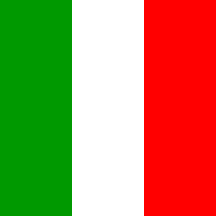
by Joe McMillan, 5 November 2003

Last modified: 2005-06-25 by dov gutterman
Keywords: italy | lagunari | venice | st. mark |
Links: FOTW homepage |
search |
disclaimer and copyright |
write us |
mirrors
See also:

by Joe McMillan, 5 November 2003
The color (bandiera di guerra) for army units (other than
cavalry) is a square version of the national tricolor in silk, 99
cm x 99 cm. It is mounted on a pike 2.2 m long, made of
wood covered with green velvet and decorated with ornate brass
nails arranged in a spiral. The pike is topped by a 35 cm
high finial consisting of an ornate gilt brass spearhead chased
with a five pointed star and the monogram RI (for Repubblica
Italiana), which is in turn mounted atop a gilt brass ball on
which is the name and date of establishment of the unit.
The pike is adorned with two silver cords 67 cm long, each with a
10 cm long silver tassel and a blue silk cravat 8 cm x 66 cm with
a 8-cm silver fringe at each end, to which the unit’s
decorations are pinned, the ribbons of the decorations
overlapping so that the medals hang down the cravat.
Cavalry units carry a standard (stendardo) of the same pattern
but 60 cm x 60 cm.
Air force "stormi" (groups) carry the same color
(bandiera) as non-cavalry army units
Source: Stato Maggiore dell'Esercito, Ufficio Storico
[General Staff of the Army, Historical Office] "Le Bandiere
dell'Esercito [The Flags of the Army]" Rome, 1981.
This book notes that the present design of the Italian military
color was set by a 1947 order.
Joe McMillan, 5 November 2003
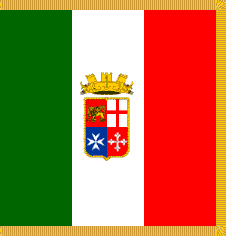
obverse
by Joe McMillan, 5 November 2003
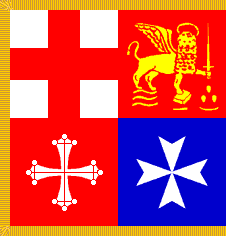
reverse
by Joe McMillan, 5 November 2003
The navy has a distinctive standard (stendardo) which is shown
in Galuppini & Gay, Insegne bandiere distintive e stemmi
della Marina in Italia (1992). The obverse is a square
version of the naval ensign, 78 cm x 78 cm, while the reverse is
the design of the naval jack. The standard has gold fringe
on the three free sides. It is mounted on a pike 2.15 m
long by 32 mm in diameter, topped with a 24 cm bronze finial
consisting of a sphere inscribed “Marina Militare”
topped with a naval crown. Below the sphere are attached a
blue cravat, 1.6 m long by 75 mm wide, with fringe at each end,
inscribed with the unit name, tied in the center; a 1.4 m cord
with tassels; and, above the standard, a replica of the
commissioning pennant of the Marina Militare, 9 cm wide at the
hoist and 1.8 meters long. The flag is attached to the pike
by four loops built into the fabric of the flag.
Source: Stato Maggiore dell'Esercito, Ufficio Storico
[General Staff of the Army, Historical Office] "Le Bandiere
dell'Esercito [The Flags of the Army]" Rome, 1981.
Joe McMillan, 5 November 2003
I think Bandiera di Guerra (Colours) have been presented to
certain unit/formations of the Italian Marina Militare (Navy)
different from that of the usual naval stendardo (standards) as
presented here.
Recent photographs taken at the Festa della Marina Militare (Navy
celebrations?) on 10 June 2005 shows them parading/presenting a
rather large rectangular Italian naval ensign attached to the
ceremonial pike with the blue ribbons and all, which can be
viewed at <www.marina.difesa.it/35.jpg>.
The naval standards are still available and paraded too at the
event, as seen at <www.marina.difesa.it/10.jpg>.
For more photographs of the event, see the main page at, <www.marina.difesa.it>.
Also which might be of interest, the Guardia Costiera (Coast
Guard) is part of the navy, thus they too have a naval standard,
as presented at their website <www.guardiacostiera.it>,
where one can see their name embroidered on the blue ribbon.
Herman FMY, 20 June 2005
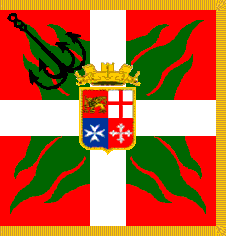
San Marco Battalion (obverse)
by Joe McMillan, 5 November 2003
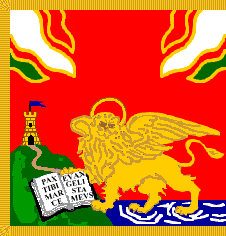
San Marco Battalion (reverse)
by Joe McMillan, 5 November 2003
I have seen a red flag ith golden outline of a shield with a
golden winged lion holding sword, very much like the lion of St.
Marcus of Venice. I have no idea what this flag was.
Željko Heimer, 8 November 1996
The italian marines (lagunari) are based at Venice and
(if I recall correctly) use venetian symbols. In fact, they are
named "Battaglione San Marco". They are usually
sent in all military missions outside Italy, so I guess they are
in Bosnia too.
Giuseppe Bottasini, 8 November 1996
I red about italian marines "lagunari".I confirm
they are based in Venice at Malcontenta, Sant' Andrea Island and
few other places. At the moment they are not employed in Bosnia
nor they are sent on other missions.Probably Mr.Bottari confused
Lagunari with an other corp that belongs to the Navy command
placed in Taranto ( the San Marco Battaglion) that actually are
working in Bosnia and use the Venice
Repubblic Lion Flag (golden S.Marcus lion on red field) Lagunari
is a selected corp of Army for sea attack,landing and
sabotage and the simbol is the same as above but the lion hold a
knife and a corsar gun.The Lagunari corp born in 1200 in
Venice named "fanti de mar" ,the sea enfantry;
their activity was ,more or less, the same of the corsar Drake...
a legalized piracy.
P D Cortese, 24 Febuary 1999
The official site of LAGUNARI association: <members.tripod.com/LAGUNARI>.
Francesco Annis, 22 July 1999
In Italy we have two different units that have similar
symbols. One is the Reggimento Lagunari "Serenissima"
(Italian Army), that is trained to defend the "Laguna"
(the shores around Venice) and is based in Venice. It takes its
origins from "Fanti da mar", a venetian unit formed in
1400. So it takes from Venice this symbol. Due to the particular
enviroment, they receive amphibious training.
The other one is Reggimento San Marco (Italian Navy) that is the
Italian Marines unit (it is trained to land abroad). It takes the
symbol from its name, that is the same of Saint Mark, the patron
of Venice. This Regiment origined from Reggimento Lagunari in the
WWI and became division with Italian Social Republic in WWII. It
is in project to put both units in a Amphibious brigade under the
command of Joint Chief of Staff.
Please, take note that the lion with the tail UP is a symbol of
war (in fact it was the symbol of Venetian Navy), with the tail
DOWN it is a symbol of peace (or of the country that is at that
moment in peace).
As you can see , the flag of
San Marco Regiment is a lion with tail down and a book without
any sword.
The flag of Lagunari is
different, and it is an anchor with crossed rifles. Viceversa,
the emblem worn on BDU, that in italian is called
"mostrina", is the lion of St. Mark with a book and a
sword.
Regiment San Marco was in Kosovo, but not in Bosnia with IFOR (it
was the theatre reserve of IFOR, and remained afloat); maybe they
have been in Bosnia with SFOR. Lagunari Regiment was in Bosnia
and Kosovo. The lion of St. Mark is also the symbol on Nato
Command LANDSOUTH, based in Vicenza (a venetian ruled town), the
command in charge of IFOR.
Angelo L.Pirocchi , 17 January 2000
"La bandiera Colonnella del
Battaglione San Marco", and info in Italian at <www.btgsanmarco.it>.
Dov Gutterman, 9 August 2001
On eBay there was "SAN MARCO MARINE FLAG Italian Fascist
WW2" at <cgi.ebay.com>:
"Attributed to the elite San Marco Marines. Black wool field
with prominent off white skull and crossbones in center. One side
also has a hand cut red dagger directly below skull/ crossbones.
Yellow hand cut naval anchor, indicating Marine unit, lies
between skull and dagger. Four heavy white elongated stripes, 3
in upper left corner, on in upper right corner. These may
indicate campaigns/ battles. All insignia appears hand made, not
factory mass produced. Heavy bunting with thick cord (similar to
type found on naval flags) are attached to banner. What appear to
be maker name appears on one corner near bunting in red paint
stamp."
Here is a photo from the
site.
Rob Raeside, 13 Febuary 2002
The navy's San Marco Battalion (one of Italy's two military
organizations roughly equivalent to Marines) also has a
distinctive color, known as a bandiera colonella. This flag
is also shown in the Galuppini and Gay book. The obverse is
red with a white cross throughout, and on the center the coat of
arms from the naval ensign; issuing from the center, on each of
the red quarters, three green flames, and superimposed on the
upper hoist quarter a black anchor with three flukes set
diagonally, stock to the upper hoist. The reverse is also
red, with a landscape showing the lion of St. Mark (of Venice)
supporting a book inscribed Pax tibi Marce evangelista mevs
standing on a shore in front of a tower; issuing from each of the
upper corners red, white, and green flames all fimbriated
gold. The flag is trimmed with gold fringe on the three
free sides.
Source: Stato Maggiore dell'Esercito, Ufficio Storico
[General Staff of the Army, Historical Office] "Le Bandiere
dell'Esercito [The Flags of the Army]" Rome, 1981.
Joe McMillan, 5 November 2003